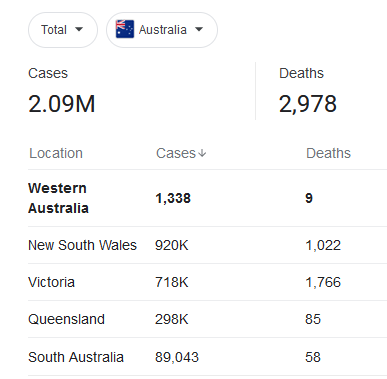Western Australia:

Per Capita Cases, Western Australia: .11%.
Per Capita Deaths, Western Australia: practically none.
Per Capita Cases, Australia: 8.1%
Per Capita Deaths, Australia: .12%
Per Capita Cases, USA: 21%
Per Capita Deaths, USA: .26%
Australia is famous, or perhaps infamous, for its lockdowns, but Western Australia has essentially closed its borders since Covid. Australia has thus done far better than the US, with fewer cases and even fewer deaths per capita. Western Australia, on the other hand, essentially hasn’t had a pandemic, at least not in terms of deaths and cases.
Of course, all numbers will be under-counts, but I doubt the overall picture changes because of that.
What this tells you is something simple: Basic measures for dealing with a plague were required to control Covid and would have worked. If travel, except for shipping, had been shut down the way that Western Australia did (ship crews staying on ships), then Covid would be controlled, and most likely, over by now.
Simply stopping travelers (or at least forcing them into long quarantines) is probably the oldest method of plague control in history, used for thousands of years.
We didn’t even do that. Our leaders wanted us to die and get sick, and we did. Our media rains contempt on places which dare control Covid. In those cases where our leaders preferred we not die, and were willing to do what is necessary to ensure our health and well-being, we did not die.
Had we done things right, at the start, there would have been no Omicron and probably no Delta. It wasn’t hard, it would have spared the economy in the long run, and a lot of people wouldn’t be dead or have long Covid, with more to come.
Let NO ONE tell you that letting Covid run free as a plague was not a choice. It has more than doubled the wealth of billionaires, and so a choice was made: Their money was more important than your life or health, or that of your parents, grandparents, children, or friends.
People were killed so the rich could get richer. Every one of you who has Long Covid has it because that’s what the rich wanted, so they could get richer.
Had this been done properly, at the start, or even after a couple months, we also would most likely be finished with most Covid restrictions — except maybe a few travel bans to a few countries, so, ironically, clamping down hard would have made any civil liberties restrictions (the right to infect other people or force your workers to infect others) brief and not in danger of turning chronic, like Covid.
Your leaders kill you, disable you, and they do it to get richer.
Understand that at your core. They are your enemies, by any reasonable definition of enemy, with a few rare exceptions, like in Western Australia.
(Near the start of the plague I noted that if US states wanted to control Covid, those which did the right things (currently, so far as I know, none of them) would be required to close their borders to other US states. Western Australia shows the difference that makes.)
Elevated from Comments: This comment, from GM, is important enough that I’ve partially quoted it here:
1. Over the last few days they have had one, then two, then five, then now seven local cases, and they are not in lockdown to stop it (while previously, they did lockdown for three days over even a single case). So there is a real danger that this is deliberately allowed to get out of hand and then McGowan says “Well, it is out of the bag now, we will reopen.” There have been mentions from the local government previously that if an outbreak gets out of control, they will reopen, and this would be following the script that played out already elsewhere (NSW, VIC, Vietnam, Singapore, etc.) that allows the government to both ease the population into endemic COVID and save face by putting a “Look, we tried our best, but there is nothing that can be done” facade over it.
2. There is a long-standing suspicion that the local oligarchs controlling the mining industry in Western Australia are the ones pushing for keeping COVID out. Not because of concern for the wellbeing of the general population, but because they want to keep it out of the mines. Of course, mines have been operating in the midst of devastating COVID outbreaks in Brazil, South Africa, Indonesia, etc. But WA is a bit of a special case because of how remote from any significant population centers most of their mines are. So if you get all of your workers seriously sick at the same time, it will be a very problematic logistic operation to transport them from somewhere in Middleofnowhereville in Pillbara to Perth, which is the only location within a 1500 km radius that can treat them. And Perth’s hospitals are barely keeping up with their load even without COVID (due to many years of the usual neoliberal defund-and-crapify practices).
1) and 2) are mutually exclusive, unless there are, indeed, as is rumored, plans to impose intrastate borders in case Perth is lost, so that COVID does not spread to the mining regions.
